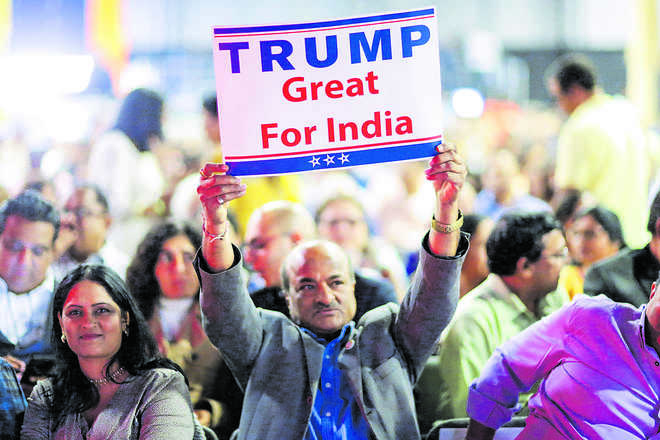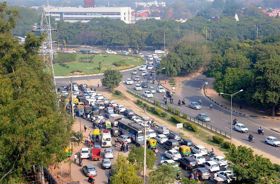
Not so great: India is not on the top of Trump’s checklist.
S Nihal Singh
OFFICIAL Delhi is keeping its mouth firmly shut, but the first hundred days of US President Donald Trump have been disappointing for India on several counts.
First, despite the telephone exchanges between Washington and New Delhi, PM Narendra Modi seems to be at the bottom of the pile in receiving an invitation to the White House. Second, tightening the rules for the H-1B visa under his “America First” brand, he has hurt India the most. Third, in undertaking a 360-degree gyration on China, Mr Trump seeks a warming of relations with Beijing in his country’s interests.
Japan’s PM Shinzo Abe was among the first official visitor in the Trump era, with a mutual interest in golf, making the Florida retreat more productive. Among the other early guests of President Trump were Britain’s Theresa May, who got a pat on the back by leaving the EU, and Germany’s Angela Merkel whose proffered handshake for television cameras was not accepted.
Unsurprisingly, Israel’s Benjamin Netanyahu joined the queue, and Mr Mahmoud Abbas of the Palestinian authority. Mr Trump’s son-in-law Jared Kushner, now an official adviser, is a practising rabbi and has been given the Israel-Palestine folder in the illusion that the problem can be solved. An invitation to Egypt’s President al-Sistani raised eyebrows and Turkey’s President Recep Tayyip Erdogan, who received a congratulatory call from the White House on narrowly winning a referendum giving him more powers while continuing to imprison thousands, is to visit Washington soon.
Indian companies receive about 70 per cent of the annual quota of H-1B visas. While raising the salary level for these visas and subjecting applicants to greater scrutiny, Trump administration officials have alleged that Indian companies have manipulated the visa system, a charge denied by the latter. Indian IT outfits are considering new avenues of cooperation, including the creation of more jobs for Americans.
The surprise in India has been how quickly Mr Trump has chosen to place India on the back burner. Of course, campaign rhetoric and the successful candidate’s action in office are two different propositions. He had patronised a minority group of Indian-American supporters and plagiarised Mr Modi’s jingle in the 2014 election, Ab ki bar Modi sarkar, to declare, Ab ki bar Trump sarkar, and spoke appreciatively about “Hindu India”, in his mind synonymous with a multi-religious nation.
President Trump’s twists and turns on China are truly amazing, even for an impetuous leader influenced by changes of mood. One constant theme of his campaign was China-baiting. He termed the country a currency “manipulator”, cast doubt of following a “one China” policy and did not have a good word for it. He accepted the “one China” policy before he had his first telephone conversation with President Xi Jinping, feasted him at his Florida retreat — no golf this time round — and even more remarkably, gave him the respect he has bestowed on no other leader, including Russia’s Vladimir Putin.
One reason for Mr Trump’s sudden love for Mr Xi is his hope for Chinese support in resolving the problem of North Korea’s nuclear programme. China, as North Korea’s lifeline, has imposed new sanctions on its neighbour. But Beijing is also keen to safeguard its own interests. It fears that the collapse of the regime of Kim Jong-un would mean thousands of refugees pouring into China and the eventual reunification of the two Koreas, a geopolitical moving of pieces that would benefit the US and its allies.
Whether it is the Israeli-Palestinian impasse or North Korea’s nuclear programme, President Trump is itching to solve problems. In the latter case, the assumption is that, if left unchecked, Pyongyang would be able to send a missile to continental United States and hence presents a potential danger.
Where does it leave India? Thus far President Trump has followed the traditional American policy of pacifying Islamabad with bigger or smaller crumbs of military and economic assistance. Surprisingly, Mr Trump’s representative in the UN, Ms Nikki Haley, threw up the idea of the US playing a role in untangling the Kashmir issue, but such statements are the staple diet of a new US administration.
Mr Modi devoted a lot of time and attention to making his number with former President Barack Obama. Now he has to start the process once again with the new occupant of the White House as and when he gets the opportunity of meeting up with him.
Good relations with the US are essential for India’s geopolitical health against the backdrop of the deterioration in Sino-Indian ties and a vengeful Pakistan all set to score points against India in Kashmir and using its close relationship with China to harm New Delhi’s interests. There is no indication that these equations will change in a hurry.
Perhaps the reason why President Trump is taking his time to talk to Mr Modi in a meaningful manner is that he realises that New Delhi has few options, with two hostile neighbours checkmating it at every turn. But if the feeling of neglect is aggravated, there would be consequences for America’s future role in the region.
Even as Mr Modi has made some bold moves in the field of foreign policy, he has been weighed down by his domestic agenda. He is, of course, doing everything to ensure his chances of winning the next general election in 2019, but in the process he must show progress in pleasing his mentor, the RSS, in transforming India into a Hindu state. This is inevitably creating major problems, particularly in BJP-ruled states. There are increasing incidents of inter-communal violence, conflicts between Dalits and upper castes and the sanctification of so-called cow protection units causing mayhem and murder with impunity. Lectures by leaders have no effect because the goons escape punishment. Until they are demonstrably held to account for their sins, there will be no peace.
Mr Modi has to work within the red lines drawn by the RSS, apart from his own upbringing in the RSS cradle and belief in some of the myths of the organisation.


























